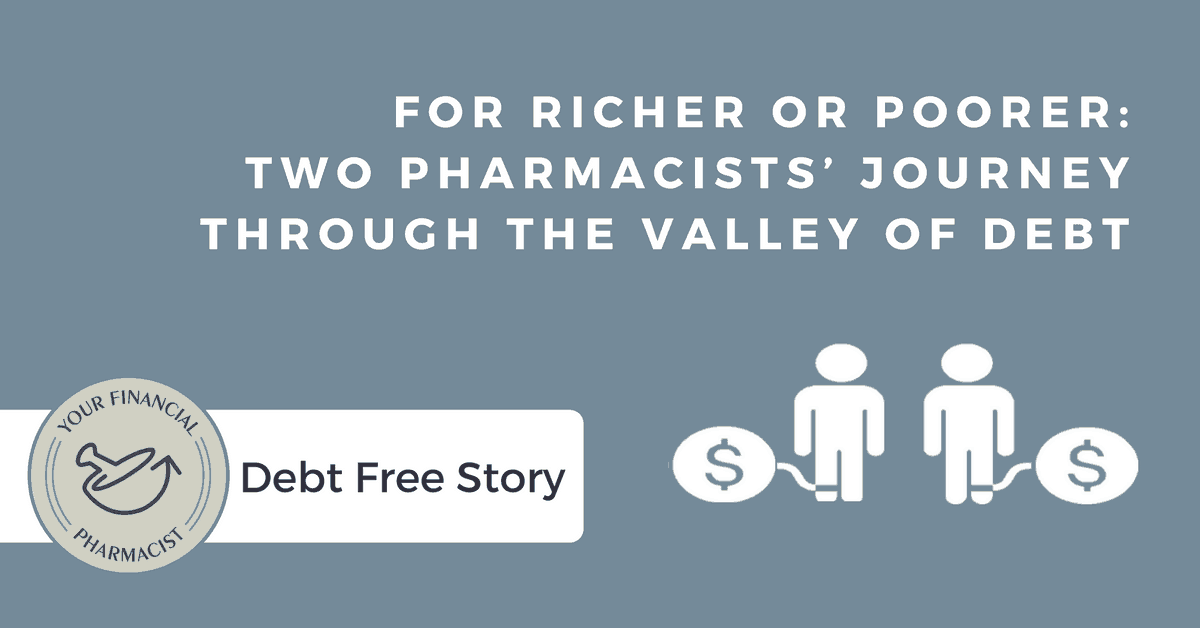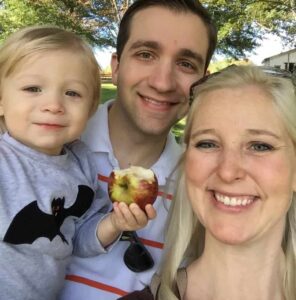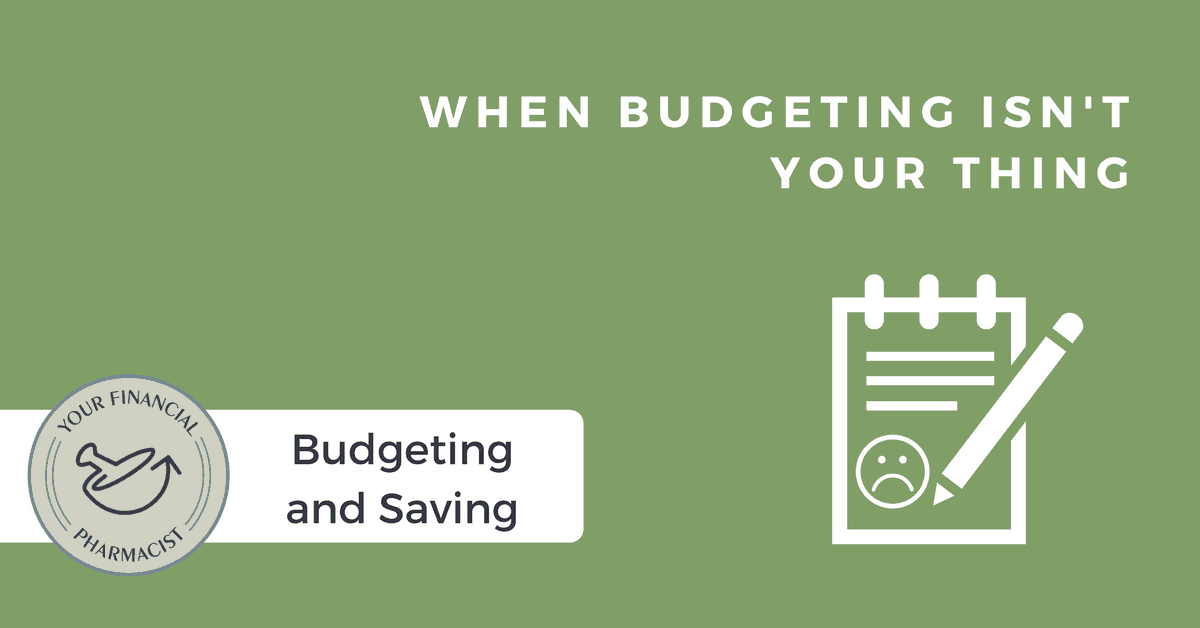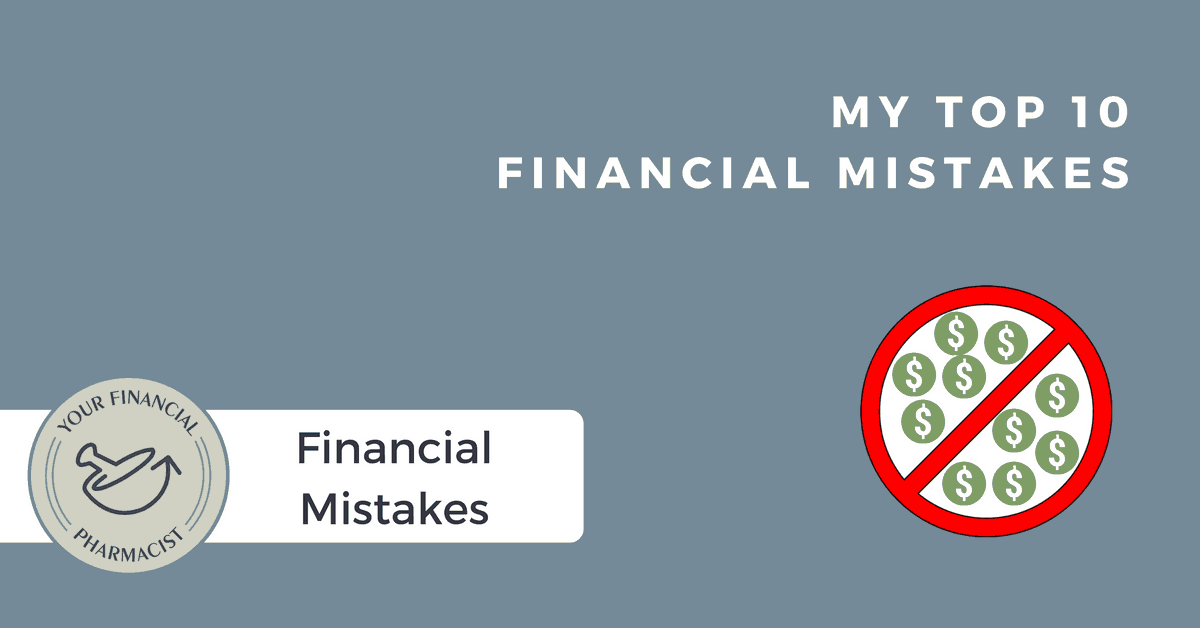The following post was written by Kevin and Erin Fuschetto. Erin Fuschetto, PharmD is a 2004 graduate of Ohio Northern University. Erin is a staff pharmacist for Giant Eagle Pharmacy in Salem, OH. Kevin Fuschetto, PharmD, BCACP is a 2007 graduate of Ohio Northern University. Kevin is the Clinical Coordinator for Giant Eagle Pharmacy in the Youngstown, OH region. I was inspired by their story to become debt free and to take control of their finances. I hope you find their story inspirational as well!
Erin: My name is Erin and I am a debt-aholic. This is my first month without debt. My debt problem began when I decided to go to pharmacy school with $0 in college savings. 6 years, 5 credit cards, 2 pharmacy degrees and one wedding later, my husband and I had accepted over $305,000 of debt. I say accepted, because we willingly signed up for this disaster. We were both full-time pharmacists with our “own money” and separate checking accounts. He paid his school loans, car, credit cards and the mortgage and I paid my school loans, car, credit cards and the utilities. We could afford the monthly payments and still enjoy fancy vacations every year. We were living the life!
Kevin: My name is Kevin and I am also a debt-aholic. Looking back at our original list of debt, my initial thoughts are, how did we get to this point? We were both pharmacists! Where was our money going? I honestly could not remember how this happened. I do remember how easy it was to go into debt. A credit card here, a car loan there and don’t forget the extra private “student” loan to pay for the wedding. We knew we couldn’t fix this on our own. We needed a new way to live. We needed help.
Erin: One day my husband came home talking about a radio show he listened to that talked about getting out of debt. He would come in every day with a new pearl of wisdom. He was spouting jargon like “snowball”, “rice and beans”, “live like no one else”. I honestly didn’t think we had a problem, so I didn’t take his words to heart, but he kept talking. He made me listen to the show and finally something clicked. We signed up for Dave Ramsey’s Financial Peace University at a local church. The first lesson for us was to get a joint checking account. I hated this idea. It was one of the toughest parts of our debt pay-off for me. I am a hider. I had cash stashed in coffee mugs, secret savings accounts and a “cushion” of $500 in my checking account, not recorded, just there to feel more secure.
Kevin: My wife and I are perfect compliments for each other. She loved to save and I loved using her “saved” money to pay off debt. She finally agreed to the joint account, but only if we got Muppet checks. Kermit, Miss Piggy and Animal made a lot of payments to our creditors. Not only did this simplify our debt pay off plan, it also seemed like we had more money! No more, I’ll pay this, you pay that, transfer this money here. We were well on our way. We ran our credit reports and closed all of our credit cards (even those we didn’t even remember we had) the first month. Then we cut them up, even my beloved Best Buy MasterCard… no more new DVD Tuesdays for me. Debit card or cash only for this family. Can you believe it? Paper money still pays for things!
Erin: The next few months were a crazy crash course in how to live on a budget and say no to new shoes and eating out. Satellite radio was canceled. Magazine subscriptions gone. Lunches were packed. Coffee was made at home. Every dollar we made had a purpose and a name. We paid off the smallest debts first, then moved onto the cars! I had never owned a car without a payment! The student loans took a long time. We would get excited for our tax return, our yearly bonus or coin wrapping day, because all of that was extra money to help us hit our goal.
Kevin: Initially the budgeting process was not easy, it took many months and meetings to fine tune the budget. We built up a small emergency fund and learned to plan for expenses. When a bill or an unexpected expense occurred, it was a great feeling to know the money was already there. We learned to cash flow everything! We wanted to start a family so we planned, saved, and budgeted our son’s birth. To make extra money, I took a part-time job as a MTM consultant on the weekends and during the baby’s naps. We traded in our now paid-for car and bought a new (used) car. The salesman asked us what kind of payments we were looking for. My wife and I laughed and I said “We are writing you a check for the full amount today!”
Erin: Our last student loan was a whopping $90,000 consolidated loan at 9% interest for 30 years. April 21, 2016, 20 years early, we made the final payment on that loan! We changed our future! Now I get to do what I love most… save, diversify and relax!
Kevin: Now we are free to start the next phase of this journey, no more looking back at the mistakes of the past but forward toward the future. Now we can save for our son’s education so he will not be burdened with student loans. Now we can save for our retirement. Now we can give back to those people and organizations that have helped us. Now we can do whatever we want!
It was a long journey, 56 months long! We wish someone had told us growing up how loans and interest worked. We were raised that if we could afford the monthly payment, that was good enough. Now we know the myths about debt. You don’t have to build your credit. You don’t have to go into debt to succeed. What does a credit score say about you other than how much you love being in debt? You can’t retire on cash back, bonus points or air miles!
Erin: We are debt free and we will never go back! Hasta la vista Visa! See ya later Sallie Mae! Kiss my ACS!
Join the YFP Community!
Recent Posts
[pt_view id=”f651872qnv”]








